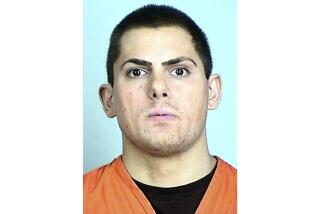Obama dogged by ties to donor
CHICAGO — Hillary Rodham Clinton dropped the name of Barack Obama’s Chicago patron into the South Carolina debate Monday night, putting front and center a tangled relationship that has the potential to undermine Obama’s image as a candidate whose ethical standards are distinctly higher than those of his main opponent.
Antoin “Tony” Rezko, an entrepreneur who made a fortune in pizza parlors, Chinese restaurants and real estate, goes on trial next month on federal charges of extortion, influence peddling and conspiracy. There is no suggestion that Obama is involved in any of the alleged criminal activity. But the upcoming trial -- and details of Obama’s relationship with its central figure -- could cast a shadow over his carefully cultivated image at a critical time.
In recent weeks, including during the debate, Obama sought to minimize the nature of that relationship. Among other things, he has returned $85,000 in Rezko-related campaign contributions in what a staffer calls “an abundance of caution.”
A review by the Los Angeles Times shows that Rezko, a businessman long active in Chicago politics, played a deeper role in Obama’s political and financial biography than the candidate has acknowledged.
For example, Rezko, his employees and business associates -- such as his consultants, lawyers and their families -- have provided Obama more than $200,000 in donations since 1995, helping fuel his rapid ascent in Illinois and U.S. politics. Although Rezko is not Obama’s largest bundler, he was there at the start and at critical moments along the way, helping support the candidate when few others were.
In addition to being a campaign benefactor, Rezko also surfaced when Obama and his wife purchased their house on Chicago’s South Side in 2005. On the day the Obamas bought their house, Rezko’s wife, Rita, bought an adjacent lot from the same sellers, part of which Obama later bought back.
Rita Rezko’s purchase, at the $625,000 asking price, came just as the Obamas successfully bid in a slow market to buy the house for $300,000 below the asking price, according to the Chicago Tribune.
The Obamas secured their brick Georgian Revival-style home on June 15, 2005, for $1,650,000. Later, the Chicago Tribune reported, Rezko paid $14,000 to build a fence, required by city ordinance, along the new property line.
Obama says there was nothing improper in these transactions. The housing deal came after it was known that Rezko was under scrutiny by federal authorities.
Obama has said that, in retrospect, the property deal was a “mistake” because of the appearance it created.
Today, Obama campaigns for president as a new kind of politician, less beholden to special interests than his opponents. He and his staff regularly contrast his policy of refusing to accept donations from lobbyists with Clinton’s practices. His relationship with Rezko may undermine the power of that claim.
Obama spokesman Bill Burton waves away such concerns, and in response contrasts Rezko against jailed Clinton fundraiser Norman Hsu.
“This has nothing on the nearly $1 million that Hillary Clinton has had to give back as a result of the Norman Hsu scandal,” he said.
“I would put Sen. Obama’s record of fighting for lobbying and ethics reform up against anyone in this race,” Burton said.
But a government watchdog group that once lauded Obama for leadership on ethics says the Illinois senator should have known better.
“Everybody in this town knew that Tony Rezko was headed for trouble,” said Jay Stewart of the Better Government Assn. in Chicago. “When he got indicted, there wasn’t a single insider who was surprised. It was viewed as a long time coming. . . . Why would you be having anything to do with Tony Rezko, particularly if you’re planning to run for president?”
Obama’s connection to the businessman dates to his return to Chicago after graduating from Harvard Law School.
Obama worked then for the Chicago firm of Davis, Miner, Barnhill & Galland. At the time, Rezko was developing and investing in low-income housing. In that role, he became one of the firm’s clients, a point that Clinton made during the South Carolina debate.
During the debate, Obama acknowledged doing as much as five hours of work for a church group that was joining with Rezko to develop low-income housing. Clinton accused Obama of helping Rezko and his “slum landlord business.”
Judson Miner, head of the firm, said in an interview that Obama billed about five hours of time working on a Rezko- related matter.
In the mid-1990s, Miner said, Rezko was viewed as an innovative developer intent on improving housing conditions, often working for church groups on Chicago’s South Side.
“He became more interested in greener pastures,” Miner said. “He got indicted. He became a bum. But in the 1990s, it was a very different picture.”
The “slumlord” reference is backed up in part by a 2007 Chicago Sun-Times investigation that found that Rezko’s low- income housing empire was collapsing, leaving many black families living in squalid conditions, sometimes without heat.
When Obama first sought public office in 1995, Rezko provided $2,000 in donations. Five years later, when Obama unsuccessfully challenged Democrat Bobby L. Rush for his U.S. House seat, Rezko and his associates contributed a much-needed infusion of cash in the final weeks of the campaign.
In 2003, when Obama launched his bid for the U.S. Senate, Rezko hosted a fundraiser at his home. The event, attended by more than 130 donors, featured an open sushi bar.
The Times arrived at the total of more than $200,000 by reviewing donations dating back to 1995, primarily looking at people who had business relationships with Rezko. Aides to Obama said they thought the total for Rezko-linked donations was lower, but were uncertain of the exact amount.
The criminal case against Rezko appears to center in part on his efforts to provide contributions to Illinois Democratic Gov. Rod R. Blagojevich in exchange for appointments to state boards and commissions. The federal investigation, dubbed Operation Board Game, produced allegations that Rezko and others sought to squeeze kickbacks from firms doing business before state boards. One oversees public schoolteacher pension investments. Another authorizes permits for hospitals.
Just a few years ago, Rezko was hobnobbing with the emir of Qatar, squiring him to Springfield and Chicago. He sold to a British billionaire -- but still helps manage -- what would be the largest undeveloped swath of land left in downtown Chicago, 62 acres along the Chicago River. He even became partners in a planned power plant in Iraq.
Obama has said repeatedly that he did nothing in exchange for Rezko’s early and consistent support.
But in 1998, then-state Sen. Obama wrote to state and city officials urging them to provide funding for New Kenwood LLC, a company formed by Rezko and Allison Davis. Obama wrote the letters, first reported by the Chicago Sun-Times, on Illinois Senate stationery, saying: “This project will provide much needed housing for 4th Ward citizens.”
Some who were part of Rezko’s world remain Obama backers.
Kelly King Dibble was a Rezko company executive, and became Blagojevich’s director of the Illinois Housing Development Authority until her resignation a year ago. She co-hosted a fundraiser in November at Chicago’s South Shore Country Club for Obama.
Dibble -- who said her friendship with the candidate’s wife, Michelle, goes back years -- said that whatever Rezko may have done, he was always decent to her: “I don’t know him to be a crook. I know him to be a nice man.” Nor does she believe he was, as Clinton said, a “slumlord,” though she noted that it is hard to maintain low-income housing.
“It is sad that it has sunk to this level,” she said.
--
dan.morain@latimes.com
--
Hamburger reported from Washington and Morain from Chicago. Times staff writer Chuck Neubauer contributed to this report.
More to Read
Get the L.A. Times Politics newsletter
Deeply reported insights into legislation, politics and policy from Sacramento, Washington and beyond. In your inbox three times per week.
You may occasionally receive promotional content from the Los Angeles Times.










